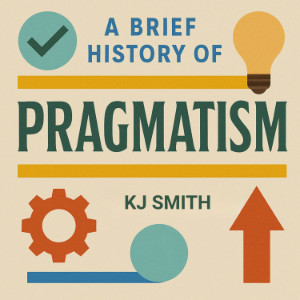

A Brief History of Pragmatism
KJ Smith
This audiobook is narrated by a digital voice.
A Brief History of Pragmatism traces the development of America's most distinctive philosophical contribution, exploring the revolutionary idea that the value of beliefs and theories should be judged by their practical consequences rather than their correspondence to abstract truths. From its origins in the late 19th-century Harvard philosophy department, this book examines how pragmatism emerged through the pioneering work of Charles Sanders Peirce, who developed the pragmatic maxim that concepts should be understood through their practical effects, William James's radical empiricism and will to believe, and John Dewey's comprehensive reconstruction of philosophy around experience and inquiry. Guiding readers through the evolution of pragmatist thought, showing how these thinkers challenged traditional philosophical problems by focusing on how ideas function in lived experience, democratic practice, and scientific investigation.
The book reveals how pragmatism experienced a remarkable revival in the late 20th century through philosophers like Richard Rorty, who argued for abandoning the quest for absolute foundations, and contemporary thinkers who apply pragmatist insights to fields ranging from legal theory to cognitive science and political philosophy. Through accessible exploration of key concepts like fallibilism, experimentalism, and democratic inquiry, readers discover how pragmatist principles have influenced everything from progressive education and social reform to contemporary debates about truth, knowledge, and moral reasoning.
Duration - 1h 13m.
Author - KJ Smith.
Narrator - Digital Voice Madison G.
Published Date - Sunday, 12 January 2025.
Copyright - © 2025 Ashleigh Robertson ©.
Location:
United States
Networks:
KJ Smith
Digital Voice Madison G
A Brief History of - Philosophy Edition
Ashleigh Robertson
English Audiobooks
Findaway Audiobooks
Description:
This audiobook is narrated by a digital voice. A Brief History of Pragmatism traces the development of America's most distinctive philosophical contribution, exploring the revolutionary idea that the value of beliefs and theories should be judged by their practical consequences rather than their correspondence to abstract truths. From its origins in the late 19th-century Harvard philosophy department, this book examines how pragmatism emerged through the pioneering work of Charles Sanders Peirce, who developed the pragmatic maxim that concepts should be understood through their practical effects, William James's radical empiricism and will to believe, and John Dewey's comprehensive reconstruction of philosophy around experience and inquiry. Guiding readers through the evolution of pragmatist thought, showing how these thinkers challenged traditional philosophical problems by focusing on how ideas function in lived experience, democratic practice, and scientific investigation. The book reveals how pragmatism experienced a remarkable revival in the late 20th century through philosophers like Richard Rorty, who argued for abandoning the quest for absolute foundations, and contemporary thinkers who apply pragmatist insights to fields ranging from legal theory to cognitive science and political philosophy. Through accessible exploration of key concepts like fallibilism, experimentalism, and democratic inquiry, readers discover how pragmatist principles have influenced everything from progressive education and social reform to contemporary debates about truth, knowledge, and moral reasoning. Duration - 1h 13m. Author - KJ Smith. Narrator - Digital Voice Madison G. Published Date - Sunday, 12 January 2025. Copyright - © 2025 Ashleigh Robertson ©.
Language:
English
INTRODUCTION
Duration:00:06:27
ROOTS OF PRAGMATISM
Duration:00:08:15
CHARLES SANDERS PIERCE
Duration:00:09:30
WILLIAMS JAMES
Duration:00:09:27
JOHN DEWEY
Duration:00:10:27
EVOLUTION OF PRAGMATISM IN THE 20TH CENTURY
Duration:00:09:38
PRAGMATISM IN THE 21ST CENTURY
Duration:00:12:02
CONCLUSION
Duration:00:07:55